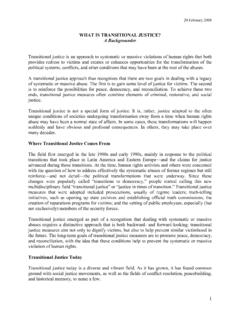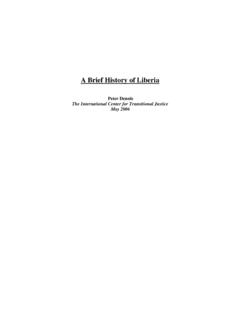Transcription of Police Reform - DCAF
1 SSR BACKGROUNDERP olice ReformApplying the principles of good security sector governance to policingAbout this seriesThe SSR Backgrounders provide concise introductions to topics and concepts in good security sector governance (SSG) and security sector Reform (SSR). The series summarizes current debates, explains key terms and exposes central tensions based on a broad range of international experiences. The SSR Backgrounders do not promote specific models, policies or proposals for good governance or Reform but do provide further resources that will allow readers to extend their knowledge on each topic. The SSR Backgrounders are a resource for security governance and Reform stakeholders seeking to understand and also to critically assess current approaches to good SSG and this SSR BackgrounderThis SSR backgrounder is about applying the principles of good security sector governance (SSG) to policing through Police Reform .
2 The Police are the primary state security provider responsible for protecting people and property through public assistance, law enforcement, the maintenance of peaceful public order, and the identification and prevention of crime. The goal of Police Reform is to ensure that policing becomes more effective, more accountable and more responsive to the needs of all members of society within a framework of democratic security sector governance. This SSR backgrounder answers the following questions: What is Police Reform ? Page 2 Why is Police Reform necessary? Page 2 Is there a model for Police Reform ? Page 5 How are Police reforms carried out?
3 Page 6 How is gender equality part of Police Reform ? Page 8 DCAF SSR backgrounder | Police Reform2 What is Police Reform ?In an SSR context, Police Reform aims to transform the values, culture, policies and practices of Police organizations so that Police can perform their duties with respect for democratic values, human rights and the rule of law. Such Reform aims to achieve a professional style of democratic policing that: Takes a people-centred approach to security; Protects human rights in accordance with national and international law; Is responsive to the different security needs of all people regardless of gender, age, class, ethnicity or other characteristic or association; Assists all people, in particular those members of the community in need of immediate help; Upholds high levels of accountability in its conduct; Establishes an effective system of democratic control and oversight over the Police .
4 Builds a public service that is efficient and Reform also aims to improve how the Police interact with other parts of the security sector, such as the courts and departments of corrections, or executive, parliamentary or independent authorities with management or oversight responsibilities (see figure 1).Why is Police Reform necessary? The political, legal and social context within which Police operate often changes. Public security institutions need to be created or adapted to meet changing security needs as well as the expectations of the communities they serve. Police Reform in the context of SSR may become necessary for a variety of reasons that depend on the local, national and international context.
5 For example: The normal process of responding to changing security requirements, such as changing patterns of crime or new threats to public safety; New or updated legal frameworks; Changes in political direction through elections or new appointments to office; Exposure of Police malpractice or corruption; Peacebuilding, post-conflict reconstruction or transitional justice measures; Implementation of a peace agreement; Conflict prevention and mediation; Social transformation and changing social expectations, such as greater demand for gender equality; Establishment of a new political system through democratization.
6 The Police The Police are state security providers with the primary task of protecting people and property through public assistance, law enforcement, the identification, investigation and prevention of crime and the maintenance of peaceful public order. Police are on the front line of security provision by the State and thus are the security provider that members of the public most frequently encounter in their daily lives. The Police and other law enforcement agencies hold special powers that, under specific, legally defined circumstances, allow them temporarily to limit the exercise of basic rights, deprive people of their freedom and use force, including lethal force.
7 Because of their powers and their proximity to the public, how the Police fulfil their duties has direct impacts on the security of individuals and communities, as well as the more information on the Police , please refer to the SSR backgrounder on The Police . DCAF SSR backgrounder | Police Reform3 Figure 1 Police Reform involves a variety of state and non-state actorsJudicial oversight Judges ProsecutorsProvides criminal justice for the public and the Police ; reviews legislationPolitical oversight and control Administration at local, regional or national level Ministry of the Interior InspectorateSets direction and policies for reformLegal framework and legislative oversight Parliament and specific parliamentary commissionsProvides legal framework for Police Reform .
8 Initiates inquiriesExternal support International/regional human rights bodies DonorsAssists through financial, technical and human resources and expertisePublic oversight Media Civil society organizations AcademiaExpresses needs for Reform ; provides expertise and inputExternal oversight Ombuds institutions National human rights institutions Investigative commissionsEvaluates and reviews Police Reform implementationInternal control and supervision Police inspectorate or Police complaints bodies Leadership and managementContributes to analysis, planning and implementation of reformJudiciaryExecutiveLegislatureInter national communityCivil societyIndependent oversight mechanismsPolicePolice reformDCAF SSR backgrounder | Police Reform4 Police Reform commonly aims to.
9 Achieve equal treatment and opportunities for all in access to security and justice, with Police and judicial services protecting and promoting respect for human rights and the rule of law; Improve public awareness of policing through the provision of balanced and relevant information about Police funding, expenditure, activities and results, as well as the legitimate roles and responsibilities of the Police ; Address corruption and promote integrity through training, effective complaint mechanisms and the removal of incompetent or corrupt officers; Modernize outdated procedures and update legal frameworks, codes of practice, training and operating procedures; Achieve cooperation among law enforcement agencies with different local and national jurisdictions, including through multilateral frameworks, as well as with other security actors such as the military, civil defence forces and intelligence or border authorities; Improve the efficiency and effectiveness of the Police organization to improve performance of its legal duties, ensuring proper use of public resources.
10 Good security sector governance (SSG) and security sector Reform (SSR) Good SSG describes how the principles of good governance apply to public security provision, management and oversight. The principles of good SSG are accountability, transparency, the rule of law, participation, responsiveness, effectiveness and efficiency. The security sector is not just security providers: it includes all the institutions and personnel responsible for security management and oversight at both national and local good SSG is the goal of security sector Reform .


